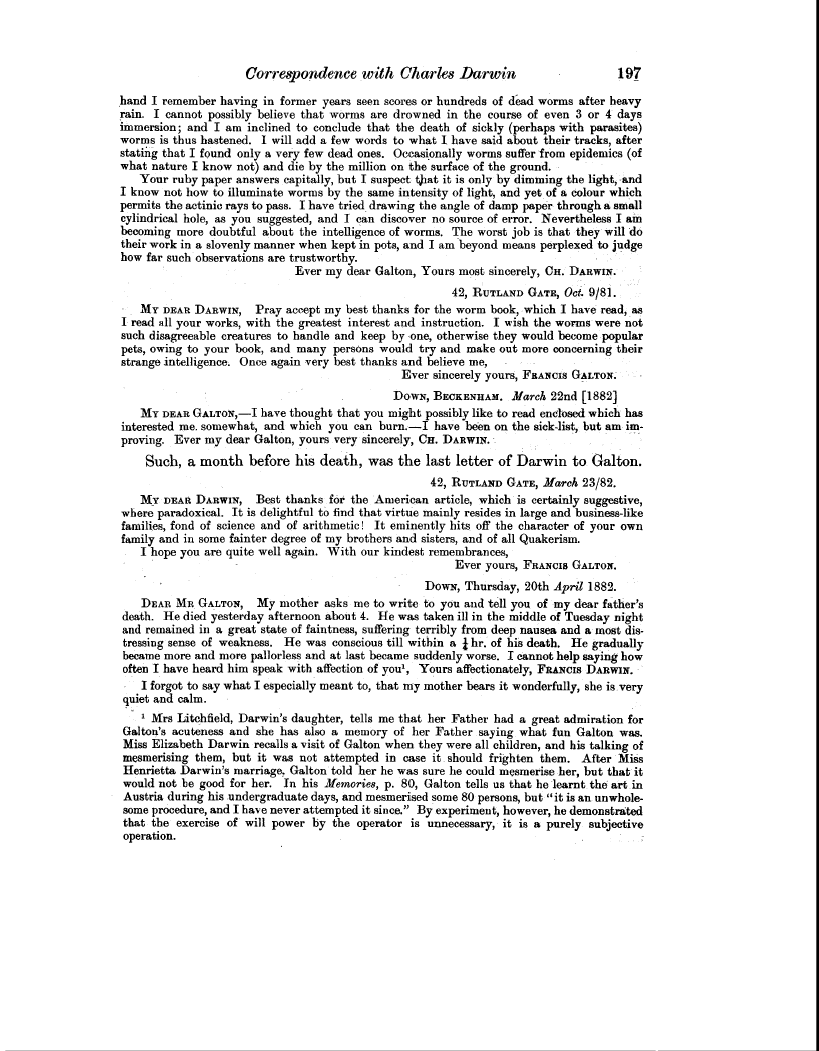Correspondence with Charles Darwin 197
hand I remember having in former years seen scores or hundreds of dead worms after heavy rain. I cannot possibly believe that worms are drowned in the course of even 3 or 4 days immersion; and I am inclined to conclude that the death of sickly (perhaps with parasites) worms is thus hastened. I will add a few words to what I have said about their tracks, after stating that I found only a very few dead ones. Occasionally worms suffer from epidemics (of what nature I know not) and die by the million on the surface of the ground. -
Your ruby paper answers capitally, but I suspect *at it is only by dimming the light,-and I know not how to illuminate worms by the same intensity of light, and yet of a colour which permits the actinic rays to pass. I have tried drawing the angle of damp paper through a small cylindrical hole, as you suggested, and I can discover no source of error. Nevertheless I am becoming more doubtful about the intelligence of worms. The worst job is that they will do their work in a slovenly manner when kept in pots, and I am beyond means perplexed to judge how far such observations are trustworthy.
Ever my dear Galton, Yours most sincerely, CH. DARWIN.
42, RUTLAND GATE, Oct. 9/81.
MY DEAR DARWIN, Pray accept my best thanks for the worm book, which I have read, as I read all your works, with the greatest interest and instruction. I wish the worms were not such disagreeable creatures to handle and keep by one, otherwise they would become popular pets, owing to your book, and many persons would try and make out more concerning their strange intelligence. Once again very best thanks and believe me,
Ever sincerely yours, FRANCIS GALTON.
Dowx, BECKENHAM. March 22nd [1882]
MY DEAR GALTON,-I have thought that you might possibly like to read enclosed which has interested me. somewhat, and which you can burn.-I have been on the sick-list, but am improving. Ever my dear Galton, yours very sincerely, CH. DARWIN.
Such, a month before his death, was the last letter of Darwin to Galton.
42, RUTLAND GATE, March 23/82.
MY DEAR DARWIN, Best thanks for the American article, which is certainly suggestive, where paradoxical. It is delightful to find that virtue mainly resides in large and business-like families, fond of science and of arithmetic! It eminently hits off the character of your own family and in some fainter degree of my brothers and sisters, and of all Quakerism.
I hope you are quite well again. With our kindest remembrances,
Ever yours, FRANCIS GALTON.
DowN, Thursday, 20th April 1882.
DEAR MR GALTON, My mother asks me to write to you and tell you of my dear father's death. He died yesterday afternoon about 4. He was taken ill in the middle of Tuesday night and remained in a great state of faintness, suffering terribly from deep nausea and a most distressing sense of weakness. He was conscious till within a I hr. of his death. He gradually became more and more pallorless and at last became suddenly worse. I cannot help saying how often I have heard him speak with affection of you', Yours affectionately, FRANCIS DARWIN.
I forgot to say what I especially meant to, that my mother bears it wonderfully, she is very quiet and calm.
' Mrs Litchfield, Darwin's daughter, tells me that her Father had a great admiration for Galton's acuteness and she has also a memory of her Father saying what fun Galton was. Miss Elizabeth Darwin recalls a visit of Galton when they were all children, and his talking of mesmerising them, but it was not attempted in case it. should frighten them. After Miss Henrietta Darwin's marriage. Galton told her he was sure he could mesmerise her, but that it would not be good for her. In his Memories, p. 80, Galton tells us that he learnt the art in Austria during his undergraduate days, and mesmerised some 80 persons, but "it is an unwholesome procedure, and I have never attempted it since." By experiment, however, he demonstrated that the exercise of will power by the operator is unnecessary, it is a purely subjective operation.

